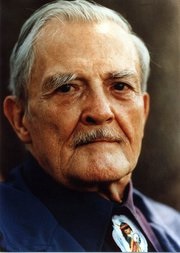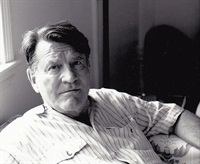Information
Milton H. Erickson, MD: Explorer in Hypnosis and Therapy - by Jay Haley and Madeline Richeport-Haley
Original Program Date :
Dec 31, 2005 (PST)
Length: 1 hour
Description:
Narrated by Jay Haley, this full color, 60-minute documentary, now available in On Demand and DVD format, offers an intimate and far-reaching portrait of this remarkable individual's life and work. You will learn how Milton Erickson overcame numerous adversities in his early life dyslexia, complete paralysis from polio at age 17, and chronic pain and how these events formed the genesis of his development as an innovator in hypnosis and therapy. Featuring abundant footage of Erickson during interviews and therapeutic sessions, many of which have never been previously released, you will learn more about the man and his work through fascinating interviews with his colleagues, students, patients, and family members. This inspiring portrait of one of the most important therapists of our time will enrich the lives of anyone interested in the extraordinary potential of the human spirit.
"In the process of understanding and working with his own pain, Erickson understood pain better than any other therapist, since he'd been down that road himself." - from the narration by Jay Haley
"He was a genius, he really was. He was a maverick..." - Robert E. Pearson
Jay Haley studied with Dr. Erickson for 17 years. He was a major editor of Erickson's works and authored many books about him. Mr. Haley has been professor at Stanford University, Howard University, the University of Maryland, and is currently professor at the California School of Professional Psychology. Madeline Richeport-Haley is a noted anthropologist filmmaker who studied with Erickson.
Milton H. Erickson, MD

Milton H. Erickson, MD, was an American psychiatrist who specialized in medical hypnosis and family therapy. He was founding president of the American Society for Clinical Hypnosis and noted for his approach to the unconscious mind as creative and solution-generating.
Dr. Erickson was plagued with enormous physical handicaps for most of his life. At age 17, he contracted polio and was so severely paralyzed that doctors believed he would die. While recovering in bed, almost entirely lame and unable to speak, he became strongly aware of the significance of nonverbal communication – body language, tone of voice, and the way that these nonverbal expressions often directly contradicted the verbal ones. He also began to have “body memories” of the muscular activity of his own body. By concentrating on these memories, he slowly began to regain control of parts of his body to the point where he was eventually able to talk and use his arms again. His doctor recommended exercising his upper body only so Milton Erickson planned a 1,000 miles canoe trip to build up the strength to attend college. His adventure was challenging, and although he still did not have full use of his legs at the end, he was able to walk with a cane.
The Ericksonian approach departs from traditional hypnosis in a variety of ways. While the process of hypnosis has customarily been conceptualized as a matter of the therapist issuing standardized instructions to a passive patient, Ericksonian hypnosis stresses the importance of the interactive therapeutic relationship and purposeful engagement of the inner resources and experiential life of the subject. Dr. Erickson revolutionized the practice of hypnotherapy by coalescing numerous original concepts and patterns of communication into the field.
The novel psychotherapeutic strategies which Dr. Erickson employed in his treatment of individuals, couples, and families derived from his hypnotic orientation. Although he was known as the world’s leading hypnotherapist, Dr. Erickson used formal hypnosis in only one-fifth of his cases in clinical practice.
Dr. Erickson effected a fundamental shift in modern psychotherapy. Many elements of the Ericksonian perspective which were once considered extreme are now incorporated into the mainstream of contemporary practice.
Jay Haley, MA

Jay Haley (M.A., 1953, Stanford University) was Director of Family Therapy Institute of Washington, D.C. He was one of the leading exponents of the strategic/interpersonal approach to family therapy. Haley served as Director of the Family Experiment Project at the Mental Research Institute and as Director of Family Therapy Research at the Philadelphia Child Guidance Clinic. He has authoered seven books, co-authored two and edited five. Additionally, he has more than 40 contributions to professional journals and books. Haley is the former editor of Family Process, and the first recipient of the Lifetime Achievement Award of The Milton H. Erickson Foundation.

